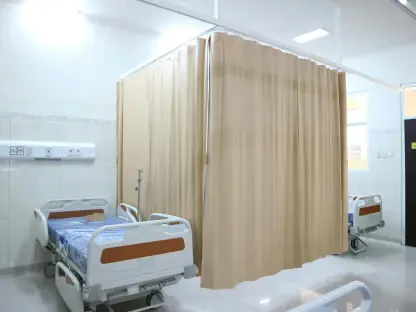In the heart of New Orleans, a critical challenge looms over LCMC Health, a safety-net nonprofit hospital system serving as a lifeline for many vulnerable patients, as it grapples with the fallout from significant Medicaid cuts following the recent passage of the One Big Beautiful Bill Act. With Medicaid accounting for nearly a quarter of its annual charges, the system faces a potential loss of coverage for 20% of its Medicaid patients, threatening the financial stability of this $3.5 billion, eight-hospital network. The anticipated increase in uncompensated care and bad debt, currently at 4% but expected to double, could push the organization from positive to negative margins. Amid this uncertainty, the leadership at LCMC Health is deploying innovative and pragmatic strategies to navigate the crisis, reflecting a broader struggle faced by safety-net providers across the nation. This unfolding situation raises pressing questions about the sustainability of healthcare access in the face of policy shifts.
Financial Challenges and Policy Impacts
Navigating Revenue Losses
The financial strain on LCMC Health is palpable as the system braces for revenue losses in the millions due to the recent Medicaid cuts. With a significant portion of its patient base reliant on this funding, the reduction in coverage directly translates to increased uncompensated care, placing immense pressure on already tight budgets. Anthony Cunningham, the chief revenue officer, has underscored the urgency of offsetting these losses to prevent a slide into financial distress. The challenge is compounded by the system’s role as a safety-net provider, where the burden of unpaid care is a constant concern. Beyond immediate revenue shortfalls, the looming threat of doubled bad debt percentages signals a deeper structural issue that could undermine long-term stability. The focus now lies in crafting strategies that not only address current deficits but also build resilience against future policy changes, ensuring that patient care remains uninterrupted despite fiscal constraints.
Systemic Vulnerabilities in Louisiana
Louisiana’s healthcare landscape, with one of the highest Medicaid enrollment rates in the country at 31.9%, amplifies the impact of federal cuts on providers like LCMC Health. The state’s heavy reliance on Medicaid, second only to New Mexico, means that any reduction in funding reverberates through the entire system, disproportionately affecting safety-net hospitals. Since the expansion of Medicaid under the Affordable Care Act, vulnerability to such policy shifts has grown, leaving providers exposed to sudden financial shocks. This situation highlights a broader trend where safety-net systems in high-enrollment states face heightened risks of destabilization. Without proactive measures, the ripple effects could lead to reduced access to care for the most vulnerable populations, exacerbating health disparities. For LCMC Health, this context underscores the need for strategic adaptations tailored to both local and national policy dynamics, balancing immediate survival with advocacy for sustainable funding models.
Strategic Responses to Medicaid Reductions
Enhancing Operational Efficiency
To counter the financial blow of Medicaid cuts, LCMC Health is prioritizing operational efficiency through technological innovation and streamlined processes. A key initiative involves leveraging artificial intelligence to optimize the revenue cycle, reducing rework and minimizing handoffs that often lead to delays and errors. This approach, already in motion before the latest legislation, has gained renewed urgency as a means to protect shrinking margins. By automating and refining administrative tasks, the system aims to improve reimbursement rates and reduce claim denials, a persistent issue with payers. The integration of such technology is not merely a cost-saving measure but a strategic pivot to ensure that limited resources are allocated effectively. This shift reflects a broader recognition that in times of fiscal constraint, efficiency can serve as a buffer against revenue loss, allowing the system to maintain its commitment to patient care without sacrificing financial health.
Strengthening Payer Negotiations and Community Support
Beyond technology, LCMC Health is taking a hands-on approach by aggressively negotiating managed care contracts to secure better reimbursement rates. Addressing challenges like prior authorizations and aged receivables with payers has become a cornerstone of this strategy, aimed at minimizing revenue leakage in an already strained environment. Simultaneously, the system is tapping into community resources to support patients facing social determinants of health, connecting them with social workers and free drug programs to mitigate care costs. Financial counselors are also playing an expanded role, conducting in-depth assessments to address holistic patient needs, particularly in light of new Medicaid work requirements. This comprehensive screening of self-pay and uninsured patients seeks to prevent write-offs by identifying issues early, before they escalate into costly emergency visits. Together, these efforts illustrate a dual focus on securing revenue through external partnerships and safeguarding patient outcomes through proactive support.
Building a Sustainable Future
Reflecting on the actions taken, LCMC Health has demonstrated a multifaceted response to the Medicaid cuts, blending innovation with fundamental tactics to protect its financial footing. The aggressive push for better payer contracts and the adoption of AI-driven efficiencies marked significant steps toward mitigating immediate losses. At the same time, the emphasis on community resources and enhanced patient screening addressed underlying social and economic barriers, aiming to reduce long-term care costs. Moving forward, the system must continue to refine these strategies, exploring additional funding avenues and advocating for policy adjustments that support safety-net providers. Collaborating with state and federal stakeholders to highlight the critical role of Medicaid in sustaining healthcare access will be essential. As similar institutions nationwide face parallel challenges, the lessons learned from these efforts could inform broader solutions, ensuring that financial viability and patient care remain aligned in an era of uncertainty.









